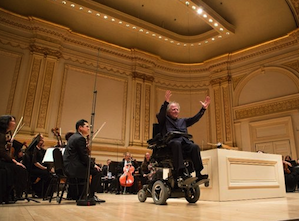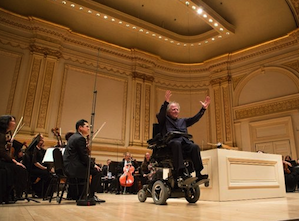
Fighting tremors, spinal problems, Parkinson’s disease, and the consequences of falls last year, James Levine is soldiering on, pledging to return to his Metropolitan Opera post next season. His comeback concert last week was an unqualified success, reviewed by Martin Bernheimer in The Financial Times:
It was hardly business as usual when the MET Orchestra visited Carnegie Hall on Sunday afternoon. James Levine was back.The beloved overachiever, now nearing his 70th birthday, has conducted 2,441 performances (an unprecedented record) with the Metropolitan Opera — essentially his Metropolitan Opera. Still, he has been missing from action since May, 2011, and many observers sadly feared New York had seen the last of him. After all, he has endured an alarming series of ailments, illnesses, accidents and surgeries. For most impractical purposes, he is now confined to a wheelchair.
It is, however, no ordinary wheelchair. It is a customised, motorised wheelchair. On this happy — OK, delirious — occasion, he drove it slowly from the wings to a special podium equipped with an elevator. Two aides helped him ascend. The capacity audience greeted him, of course, with a standing ovation, and for once the mass gesture was genuinely appropriate.
If all goes as hoped, Levine will preside over three operas next season at Lincoln Center plus three more Carnegie Hall programmes. Hope springs internal.
He has never been a particularly histrionic maestro and, it is said, he usually reserves his essential emoting for rehearsals. But here he seemed remarkably agitated, leading his devoted followers with sweeping gestures and generous cues. The results, despite a few pardonably rough ensemble edges, were often rousing, always poignant.
The festivities began with a shimmering performance of the Lohengrin prelude, a nice nod to Wagner on the occasion of his 200th birthday. The festivities ended with the massive stresses and heroic sprawl of Schubert’s 9th Symphony, played with taut propulsion, abiding grace and dynamic flair.
In between, Levine served as a sensitive partner for Evgeny Kissin in Beethoven’s Piano Concerto No. 4. The poetic firebrand, impetuous yet introspective, received, and deserved, a standing ovation of his own. He responded with a lengthy encore, raging through the riotous Beethoven rondo best known as "Rage Over a Lost Penny."
This wasn’t just a concert. It was a celebration.

